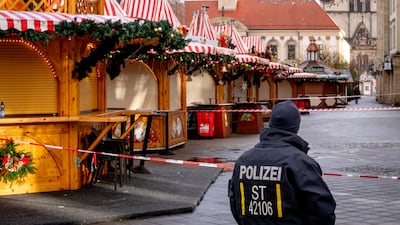When confronted by horrific scenes such as those witnessed in the German city of Magdeburg on Friday, where five people were killed and about 200 injured in a car-ramming attack, one of the first questions many people rightly ask is: why?
Certainly, the indiscriminate nature of the violence is shocking and strikes at people’s sense of security. Among the dead is a nine-year-old boy; many people who were out shopping and socialising before Christmas will be left with life-changing injuries and lasting trauma. The attack was roundly condemned by numerous countries like the UAE as well as the Muslim Council of Elders. However, at this stage, much about the attacker’s exact motives remains unknown.
A 50-year-old Saudi doctor, identified by German police as Taleb A, is the main suspect. The long-time German resident has a history of troubling online outbursts; analysis of social media accounts allegedly held by him suggests he was a vocal critic of Islam who sympathised with the German far-right. After he was arrested at the scene, police said Taleb A was acting alone. But what pushed him to carry out such a heinous attack is still unclear.
Although the police investigation is at an early stage, there are worrying suggestions that Saudi warnings about the suspect went largely unheeded by German authorities. The warnings to Germany had reportedly been made several times since the suspect left Saudi Arabia in 2006, but a report in German outlet Welt claims a 2023 risk assessment by German investigators concluded the man posed “no specific danger”.
The uncertainty has not deterred some from indulging in speculation or seizing the opportunity to accrue political capital. A group of about 1,000 people gathered in Magdeburg on Saturday night, with some brandishing a large banner with the word “remigration” written on it. Hungarian Prime Minister Viktor Orban has claimed – without evidence – that the 2015 wave of immigration into Europe is responsible, adding that the EU’s leadership wants such attacks “to happen to Hungary, too”.
Many questions hang over this case, but it is clear that security and intelligence co-operation regarding such problematic individuals will have to be reviewed and improved. Not only do the general public have the right to life in safety, but Germany’s Arab and Muslims communities – the vast majority of whom are law-abiding residents – will have to be protected from the hostility emanating from right-wing hardliners.
This is true also of such communities across Europe. Many of these people have fled war and instability at home to begin new lives in peace and security; others were born in Europe. However, collectively they are often the target of pernicious political campaigns and unfairly lumped together with the tiny groups of extremists who have carried out attacks much like that seen in Magdeburg at the weekend. Immigrants to Europe want and deserve security as much as host communities do. It is up to the authorities in Germany and elsewhere to make sure that happens, and up to everyone influencing the situation to be weary of stoking discrimination, or worse, encouraging outright violence.














